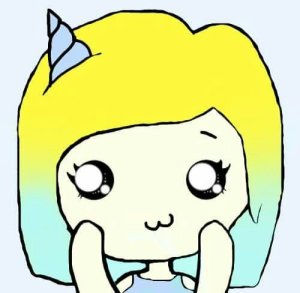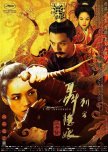Before I give my opinion on this I should probably add a little more insight on what this film is about due to the.. non-descript synopsis. Stolen from Wikipedia:
The Assassin is loosely based on the late 9th century martial arts story "Nie Yinniang" by Pei Xing, a core text in Chinese swordsmanship and wuxia fiction.The film is set in 8th century China during last years of the Tang Dynasty. The film centers on Nie Yinniang (played by Shu Qi), an assassin who is directed to slay corrupt government officials by her master, Jiaxin, a nun who raised her from the age of ten. When Yinniang displays mercy by failing to kill during her duties, Jiaxin punishes her with a ruthless assignment designed to test Yinniang’s resolve: she is sent to the distant province/circuit of Weibo in northern China to kill its military governor Tian Ji'an — her cousin to whom she had once been betrothed. I hope that made things clearer for you, cause it helped me.
The story begins in black and white, showing off the skills of our female assassin. She is ruthless and cuts the guys head off in one clean shot – quite impressive. But it’s done so quickly and smoothly that it takes a second or two for us the audience to go ‘Oh he’s dead.’ We then get shown a second side of the assassin where she is ordered to kill a man but refuses to after she finds her target and his son together after spending the day playing with each other. Her refusal to follow an order due to her ‘humanness’ means she gets sent of to kill Tian Ji’an. We then go in to colour, but still maintain a kind of… ‘old’ feel to the movie.
For anyone who is too lazy to read 2 pages worth of writing here’s a basic summary – slow story but pretty things.
First of all I must make it clear that this movie is not one which I can judge as a ‘good’ or ‘bad’ movie. If this movies hadn’t been recommended by a lecturer I met at a university (I’m planning to do Film Studies at uni next year) then I would never had watched, let alone finished this movie. Why? Well mainly – the low ratings are low for a reason. This film is incredibly slow. I don’t mean it drags, I mean it’s REALLY slow. Firstly would probably be the lack of action. With a title such as ‘The Assassin’ one would expect lots of ninja-badass fighting scenes and lots of killing people and stuff. Yeah there isn’t that much of this, I think maybe only 3 or 4 fight scenes in the whole film – not very many in comparison to other action movies. Especially if you think that quite a few of these fight scenes were shot from far distances, giving you a wider scope of the action in contrast to getting up close and personal to the actors – which is the method normally favoured by modern directors. In addition within the fighting which we do see, it’s more like graceful dancing then brutal fighting. If you watch wuxia for the bloodshed and violence, you won’t find it here. Sorry.
There are many long scenes with little talking, I would say that only about 50% of the film is talking, maybe? In addition there is basically no background music, with the director relying on background noises of water, walking, wind, etc. The only music used in this film which has nothing to do with the scene is at the end credits. It’s a good piece of music, but it is quite solitary. With all of these in mind, it does make for quite a boring story. I won’t lie, I got bored. Half way through I did eat my dinner, brush my teeth, and then started researching background information on the movie to see if there was anything interesting I could use to add to this review. There was a little bit. To be honest, I didn’t understand some of the story line – I’m guessing I just missed the crucial parts where they were actually talking or something. I’m reassured when I read reviews on other sites which state that they didn’t understand the story either. I mean, at least I understood what was basically going on.
And then of course we end on a rather anti-climatic ending thinking ‘Now what?’, but I won’t spoil it for you.
But..
Yes there is a but; a big but.
What makes this film good is not the acting or the story, but the cinematography. This film is f***ing gorgeous. I’m not surprised that Hou Hsiao-Hsien, the director, won a ‘Best Director Prize’ for it. Not only do they make large use of Chinas beautiful landscapes, but they also use a lot of techniques seen in ‘old’ films. I’m not sure whether or not that is a legitimate ‘style’ but there are a lot of similarities.
Here are the reasons I like this film/find this film interesting:
1) The landscapes – obviously. There are many lingering shots of the landscapes all around rural areas of China, Mongolia and such. Director Hou (What am I meant to address him as?) has said in interviews and such that they aimed to shoot at high altitudes because there was no civilisation there. This of course means that you get to see beautiful rolling fog and ever changing weather. I believe that the weather and such was not planned for and they just went along and filmed with what whatever weather was happening at the time. I thought that this made it much more natural, compared to the controlled and precise movies of today.
2) The fight scenes are believable. Unlike most Wuxia films we don’t have people legitimately flying left right and centre. Not gonna lie – I hate that style. In this movie I think I saw only one or two instances where he uses this, but prominently the shots and choreography is either at a far view point or… not as close as most modern fight scenes… but near enough that we get a jist. We see interaction and faces, which we don’t normally see in the ‘quick-cut’ action scenes we’re used to. It’s nice.
3) The child actors – bless them. I’m convinced that they didn’t hire any children actors and those that were featured were accidentally brought to the set one day and somehow got dragged into it. They kids just sit, play and run around as if there are no cameras. It’s awesome. Plus it looks very natural.
4) The lighting. Director Hou tried to make the lighting as natural as possible (seeing a theme here yet?). If it was day time he would try and use the outside light, if it was night time then he would make it look as much like candle light as possible. This use of natural lighting resulted in a lot of warm colours, which made me happy inside.
5) Long scenes. But isn’t that a bad thing?! Yeah. Probably. Kind of. Some scenes go on for too long, but it works in some cases. There was one scene were we see tree tops for about 20 seconds. Time yourself and stare at a wall for 20 seconds, it’s a long time. It does work better when he lets us star at rural scenes in a village for a while, or the landscape shots – they’re pretty. In addition the long scenes do also mean we aren’t cutting every 5 seconds when ever a new person talks, which brings me to the next point.
6) Composition. One of the keys to a good movie is composition. And boy does this film have some sweet composition in its frames. In some cases we get shots of a setting and then go straight into talking – this means we don’t have to have as much talking and can carry on looking at pretty things. Or we have the scenes were the camera is handheld and moves around the set from one speaker to the next – no cutting (I love this so much). We have symmetry, symbolism, thirds, etc. It’s just gorgeous. It makes me want to sit down and screen shot frames to analyses what’s in them and what it could mean, my inner English student is trying to escape!
7) The last thing which made this film so interesting is movement. In most scenes there is something moving. There are curtains, wind, fog, birds, servants, candles, even the characters themselves shift and move to make them selves comfy. I feel like maybe Director Hou has gained inspiration from Akira Kurosawa, a Japanese director. I saw this movie but I couldn’t stop thinking about the fact that they share this quality. It’s such a good idea. It makes it so that your eye is distracted and entertained whilst nothing happens in a scene. Absolute genius! I love it!
Ahh. I hope you can see why I found it so hard to evaluate whether this movie was good or bad! Yes it’s a bit dull but it’s so well made! I would say that I probably wouldn’t recommend this to anyone looking for a good story. However, if you are interesting in movies as an art, or can appreciate a well made movie then this is a good movie for you! If you think you can struggle through the slow pace then you are welcome to try it, as long as you can realise that it’s not a bad film. It’s just that the main focus is not on the story itself but the presentation of the story. The idea that the director is trying to convey. I truly think that the rating of the movie at the moment (6.2) is a bad representation of the movie. This movie is all about subtleness, be it in the detail, symbolism or the music.
I don’t know. Try it yourself and see what you think. Just watch it with a pinch of salt.
Esta resenha foi útil para você?

























